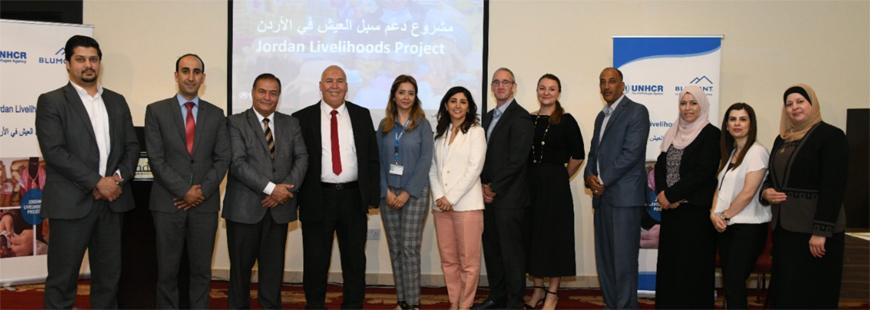You are here
Jordan Livelihoods Project helps Jordanian, Syrian women launch home-based businesses
By Blumont - Sep 19,2021 - Last updated at Sep 19,2021

Abeer, a 36-year-old Jordanian woman, saw an opportunity to make a living out of her passion for pickling. Blumont, an NGO that works for the benefit of refugees and host populations, came to her aid to launch her business (Photo courtesy of Blumont)
AMMAN — Abeer, a 36-year-old Jordanian woman and mother of four, was forced to take control of her family’s finances after the death of her husband.
She saw an opportunity to make a living out of her passion for pickling.
She at first struggled due to the complicated registration process for home-based businesses.
Blumont, an NGO that works for the benefit of refugees and host populations, came to her aid to launch her business.
“I was instantly relieved when Blumont took my hand and helped me launch my business properly,” Abeer said.
With Blumont’s support through the UNHCR-funded Jordan Livelihoods Project, Abeer was able to get a licence and register at the Ministry of Industry and Trade.
“I now can supply my products to supermarkets, restaurants and dairy shops as they refuse to deal with food suppliers that are not registered. Understanding the law made me more confident,” she said.
Home-based businesses play an important role in Jordan’s economy. Outside of the public sector, micro- and small enterprises, including home-based businesses, are a primary driver of income and growth.
The Jordan Livelihoods Project helps entrepreneurs build skills and expand their markets, while bringing their businesses into the formal economy.
Since 2019, Blumont has helped more than 220 Jordanian and Syrian refugee-owned home-based businesses become formally registered and/or licensed in Jordan.
In the first year of the project, Blumont registered a Syrian-owned home-based business.
Omamah, a 19-year old Syrian refugee entrepreneur, successfully registered her accessory business in 2021.
“I dream of growing my business and increasing my profit so I can pursue my education,”Omamah said.
In addition to legal support, the programme provides home-based business owners with training on product development and creative design, marketing, financial literacy and customer service.
Another beneficiary, Ola has been sewing tassels on the sides of keffiyehs ever since she can remember. She expanded her home-based sewing business with the support of The Jordan Livelihoods Project.
Ola turned her passion into a source of income, and with a seed grant to purchase materials and a connection to SouqFann, a digital merchandise shop, she is reaching new customers across the Kingdom. Ola has hired 10 women to work with her.
“The moment I saw my products live on the SouqFann website, I was overwhelmed with joy and pride. It has helped us achieve financial self-sufficiency,” she said.
“Without this support, I would have been lost in how to manage my business. I have become a businesswoman,” said Abeer.
The Jordan Livelihoods Project has been working with an additional 70 formal home-based businesses in refugee-host urban communities in Amman, Irbid, Mafraq and Maan governorates.
The project has also improved the livelihoods of Syrian refugees by supporting 20 Syrian-owned home-based businesses and offering vocational training and career counselling services at Zaatari camp.
(Blumont contributed this article to The Jordan Times)
Related Articles
AMMAN — UNHCR Jordan and Blumont, an NGO that provides relief for refugees and host populations, on Wednesday signed six agreements with var
AMMAN — Blumont, an NGO that works for the benefit of refugees and host populations, and the European Bank for Reconstruction and Developmen
AMMAN — Blumont, an NGO that works for the benefit of refugees and host populations, with support from UNHCR, on Wednesday announced that it

















